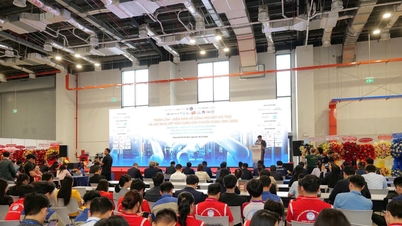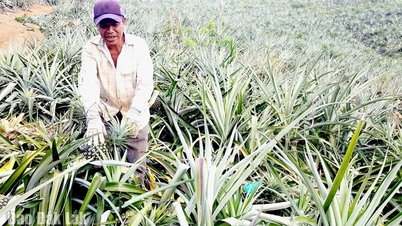
China's latest export controls on strategic materials, while aimed at consolidating its dominant position, may, according to newsweek.com, be prompting the world to diversify its sources of supply and ultimately weaken China's long-term influence in the most critical supply chains of the 21st century.
Recently, China's Ministry of Commerce announced new regulations, effective from December, requiring foreign companies to obtain permission from the Chinese government before exporting magnets and certain semiconductor materials containing rare earth elements originating from China.
Rare earth elements are indispensable to the modern economy, especially in high-tech fields such as advanced weapons systems, electric vehicles (EVs), and energy transitions. Ryan Kiggins, a professor of political science at Central Oklahoma University, noted that China's move "is entirely consistent with the broader strategic competition between the U.S. and China," where rare earth elements are "at the heart of this competition."
Decades of investment and restrictive environmental regulations have given China a near-monopoly on rare earth elements. Currently, China accounts for approximately 70% of the global supply and about 90% of global processing capacity. This is a similar proportion to the US import volume.
Western reaction
U.S. officials have strongly protested these new restrictions. U.S. Treasury Secretary Scott Bessent accused Beijing of using a “bazooka” to attack “the industrial foundation of the entire free world.” U.S. Trade Representative Jamieson Greer described the move as “an act of economic coercion” that would give Beijing “fundamental control over the entire global economy and technology supply chain.” Bessent also warned the world should prepare for and be able to “decouple” from China’s critical elements markets.
According to Jamie Underwood from the key mineral consulting firm SFA (Oxford), Western producers are facing "serious supply risks and rising input costs," and he warned that military systems in particular would be affected by this de facto ban.
Jane Nakano, a senior research fellow at the Center for Strategic and International Studies (CSIS), argues that rare earth elements are “the well-known Achilles’ heel for industrialized economies like the U.S., and China’s export controls are one of the most powerful levers Beijing possesses.”
However, many experts argue that China's use of its dominance in rare earth elements may be undermining its geopolitical tools, while simultaneously accelerating the global shift toward alternative sources of supply.
“The current restrictions could prompt Washington and its allies to intensify strategies to bring production back home, stockpile, and recycle, ultimately undermining China’s influence,” Professor Kiggins observed. He argued that, in the long term, Beijing may be “facilitating the emergence of a parallel rare earth ecosystem beyond its control.”
Underwood agrees with this view, stating: "Prolonged restrictions could drive up rare earth prices, attract excessive investment, and ultimately erode China's market share while hindering innovation and weakening its leverage."
The market also reacted to this change. Shares of US and Australian rare earth mining and production companies surged after the announcement. JPMorgan Chase also announced it would invest billions of dollars in "industries critical to national security and economic resilience," including critical minerals, whose reliance on foreign supplies is a "painfully obvious" weakness.
Brian Menell, President and CEO of TechMet Limited, an investment firm focused on "Western-oriented" supply chains, said the U.S. has the potential to reduce its dependence on China. He believes the U.S. can "spend more" and "innovate more" than China to transform technology across the entire supply chain, making it less reliant on Beijing.
TechMet, a company that receives funding from the U.S. International Development Finance Corporation, has been in "daily" contact with U.S. government agencies regarding accelerating the transition to a "China-free" source of rare earth supplies since the announcement was made.
Initial steps in diversification
The vulnerabilities of reliance on China have long been acknowledged by both the public and private sectors, prompting significant investments and recent breakthroughs. In July of this year, Apple announced a $500 million partnership with MP Materials to purchase rare earth magnets and establish new recycling and manufacturing facilities in California and Texas. In May, the Australian company Lynas became the first company outside of China to successfully produce dysprosium oxide (a "heavy" rare earth element) at its facility in Malaysia.
Although China still dominates in terms of production and processing scale, the US also has its own mineral resources such as the Mountain Pass mine in California and the Spruce Pine mining area in North Carolina.
However, expert Nakano at CSIS warns that China's enormous scale of production and processing capacity will be "difficult for anyone to match in the near future," noting that "China is not standing still" and "may continue to develop its mineral supply chain to consolidate its position."
Thus, China's latest restrictions could be leverage to secure concessions in ongoing trade negotiations, or simply a warning ahead of the anticipated meeting between US President Donald Trump and Chinese President Xi Jinping later this month. However, years of China leveraging its dominance have pushed the world toward diversification.
Source: https://baotintuc.vn/the-gioi/cac-han-che-dat-hiem-cua-trung-quoc-co-phan-tac-dung-20251027170339991.htm



![[Image] Leaked images ahead of the 2025 Community Action Awards gala.](/_next/image?url=https%3A%2F%2Fvphoto.vietnam.vn%2Fthumb%2F1200x675%2Fvietnam%2Fresource%2FIMAGE%2F2025%2F12%2F16%2F1765882828720_ndo_br_thiet-ke-chua-co-ten-45-png.webp&w=3840&q=75)
![[Photo] Prime Minister Pham Minh Chinh receives Lao Minister of Education and Sports Thongsalith Mangnormek](/_next/image?url=https%3A%2F%2Fvphoto.vietnam.vn%2Fthumb%2F1200x675%2Fvietnam%2Fresource%2FIMAGE%2F2025%2F12%2F16%2F1765876834721_dsc-7519-jpg.webp&w=3840&q=75)

![[Live] 2025 Community Action Awards Gala](/_next/image?url=https%3A%2F%2Fvphoto.vietnam.vn%2Fthumb%2F1200x675%2Fvietnam%2Fresource%2FIMAGE%2F2025%2F12%2F16%2F1765899631650_ndo_tr_z7334013144784-9f9fe10a6d63584c85aff40f2957c250-jpg.webp&w=3840&q=75)
![[Photo] Prime Minister Pham Minh Chinh receives the Governor of Tochigi Province (Japan)](/_next/image?url=https%3A%2F%2Fvphoto.vietnam.vn%2Fthumb%2F1200x675%2Fvietnam%2Fresource%2FIMAGE%2F2025%2F12%2F16%2F1765892133176_dsc-8082-6425-jpg.webp&w=3840&q=75)






































































































Comment (0)